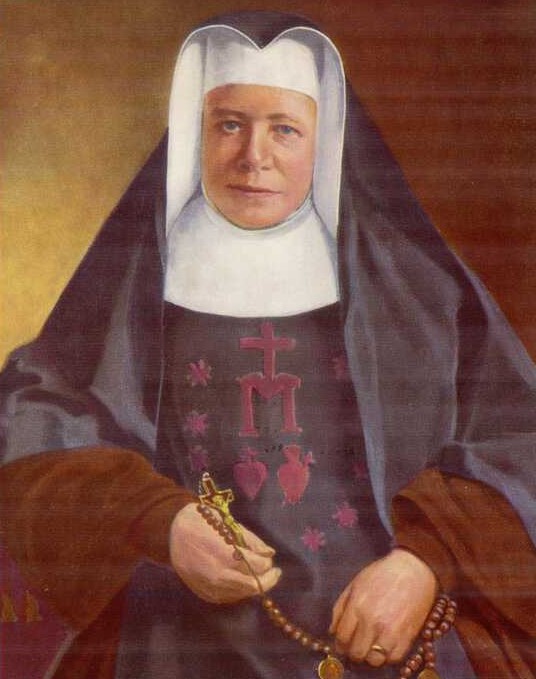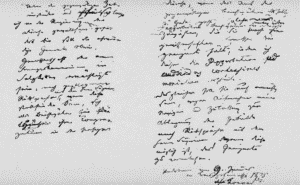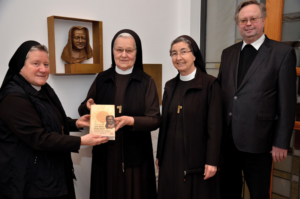Wheaton Franciscan History
<<Return to Discover Our Heritage

The life of Mother M. Clara Pfänder, foundress of the Franciscan Sisters, Daughters of the Sacred Hearts of Jesus and Mary, was often challenging. She survived and persevered with deep faith and a strong resolve to accept everything in life as Divine Providence. Mother Clara’s religious community, founded in 1860, was caught in the hostile political environment of the early 1870s as the state of Prussia passed laws to severely limit the influence of the Catholic Church. The Kulturkampf (culture struggle) drove the Jesuits out of the country and forbid men and women religious from teaching or running orphanages. The restrictions also prevented new members from being accepted into religious communities without prior approval from the Prussian State.
Bishop Konrad Martin of the Diocese of Paderborn, Germany, was a champion of Catholic causes and of Mother Clara and her community. However, his strong support of the Church led to his eventual imprisonment.
In 1875, Mother Clara visited the bishop in prison where he quickly wrote out plenary powers ordinarily reserved for clergy. Sworn to secrecy, this document gave her special authority which included accepting the vows of women entering the order and bringing women into the novitiate.

Due to the harsh restrictions imposed by the Prussian State, on several occasions, Mother Clara found it necessary to utilize these powers to protect Father Klein, the congregation’s Ecclesiastical Moderator, from possible imprisonment. Because of her secretive actions, suspicion around Mother Clara began to grow.
Never betraying the trust of Bishop Martin, Mother Clara was eventually driven out of the congregation she founded. Misunderstood and distrusted by the hierarchy of the Church in Paderborn, she was exiled from the daughters she loved to Rome, Italy. There, for two years, she attempted to clarify her situation and return to the service of love that was her life but was blocked on every front. Receiving little support and growing weaker, Mother Clara soon fell into ill health. She died in Rome of diphtheria on October 5, 1882.
The Sisters of the entire congregation suffered the loss of their foundress and their guiding light, though it was especially harsh for the community in Germany. There, they were forbidden to mention her name or show a photograph of the foundress whom they had loved deeply. The original document from Bishop Konrad Martin, granting Mother Clara secret authority, was found in 1977 in an archive in Rome, almost a century after Mother Clara’s death.

In the 2018 book, The Sun Remains Above, Sister Carola Thomann traces the life of Mother Clara, especially during her most difficult days. Sister Carola dedicated years of careful research in Rome, Germany, and the Vatican to collect and document the facts of Mother Clara’s life along with those of the clergy who surrounded her. Sr. Carola was assisted by a canon lawyer, Msgr. Ruediger Althaus, a professor at the Faculty of Theology in Paderborn.
Ultimately, Sister Carola found that Mother Clara had not been excommunicated when she was forced to abdicate her leadership in 1880, as was claimed by Father Klein, the Ecclesiastical Moderator of the congregation. Her thorough biography of Mother Clara, as well as the indisputable facts she uncovered, proves Mother Clara acted within the authority entrusted to her by Bishop Konrad Martin.
In February 2018, at a special Mass in the Cathedral of Paderborn, Archbishop Hans-Joseph Becker proclaimed that Mother Clara had suffered a great injustice during the Kulturkampf in Prussia. The allegations against her did not correspond to the facts of her life. In truth, she lived bravely and with great integrity to God, the Church, and her congregation, never trying to clear her own name but knowing that all was well between her and God. Later that day, the bishop blessed a sculpture of Mother Clara and a commemorative plaque in a side altar of the Cathedral, where Bishop Martin is also honored. We celebrate the good name of our dear foundress with thanksgiving for all she was in her life and for all the people who have been “helped through love” in her name.


what a wonderful article. Kevin captured the essence of M. Clara’s story in a very short article. Well done.